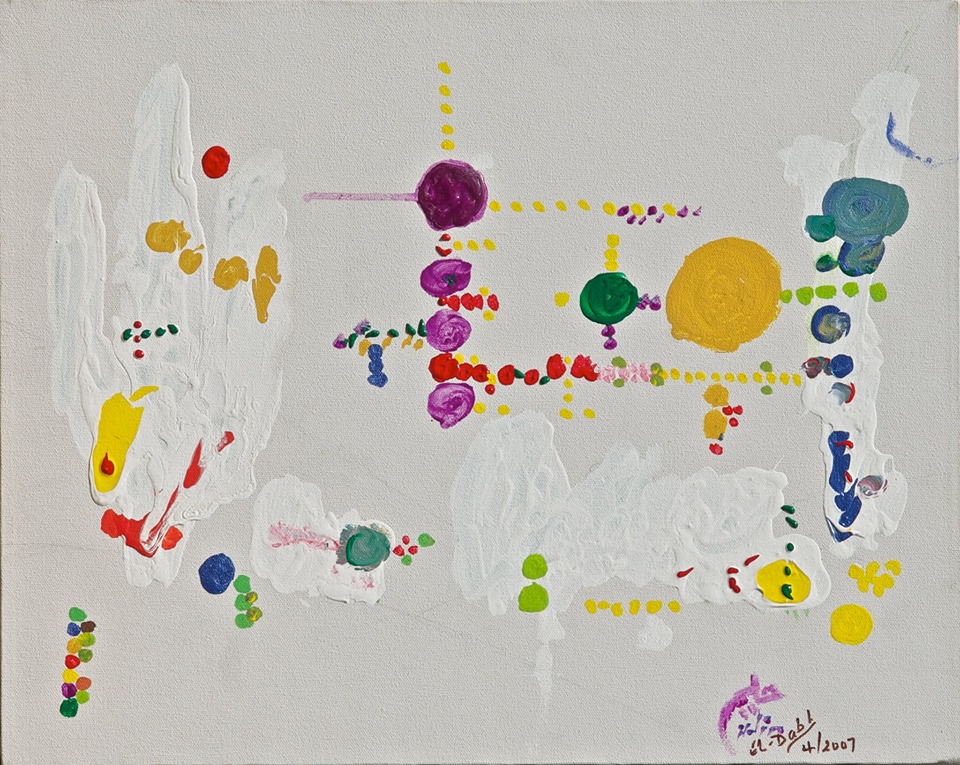Sonically transformed. Haunting vibrations converging in crescendo. Signifying colourways correlating corresponding frequencies as musical notation. Perforating paper-thin eardrums. Beating through a spectrum of sounds. Tones sculpted, mixed and mastered. The music of modernity finds its tonal traces in histories of the past.
The recently deceased Halim El-Dabh, was an Egyptian American composer. His six-decade experimental music career positioned him as a pioneer of electronic music. In 2007 he performed his album The Dog Done Gone Deaf for the Suoni Per Il Popolo Festival in Montreal, Quebec. The musical piece is a fable of the Navajo indigenous American people – the relationship between man and hound. The narrative explores how the dog saves the man’s life, only to be treated with brutality. In response to the violence, the dog covers its ears and goes deaf. However, it eventually forgives the man, in realising that they are both creatures of the earth.
It was in the middle of the session of The Dog Done Gone Deaf, that El-Dabh invited the audience to close their eyes and breathe together – creating a collective participatory performative moment, one that he hoped would elicit an experience of colour frequencies. A notion that was central to the process and notion of his work.
CANINE WISDOM FOR THE BARKING DOG/THE DOG DONE GONE DEAF is described as a “spin-off” by the projects curator, Bonaventure Soh Bejeng Ndikung. He goes on to say that it, “seems an appropriate entry point into a venture of reflecting on and paying tribute to one of the greatest composers from the African continent and worldwide, Halim El-Dabh, in the framework of Africa’s most important and most consistent art manifestation, the Dakar biennial.”
El-Dabh appropriates and invents mythologies in his compositions while disseminating sonic and aural epistemologies. “The exhibition project will also serve as a platform for deliberations on, and experimentations as to what is and where is sound art in contemporary African art, putting a spotlight on transdisciplinary artistic practices between the visual, performative, installative and sonic mediums.”
Bonaventure highlights the importance of narrating and actively claiming one’s own histories within a framework of Pan-Africanist ideology. “Our intention is also to re-establish a genealogy of modern arts and sound arts in Africa and beyond, and contemporary sound artists, painters, video and installation artists are hereby invited to relate, extrapolate from, get inspired by El-Dabh’s practice – his compositions, installations, theories and research.”
Younes Baba Ali, Leo Asemota, Satch Hoyt, Tegene Kunbi, Memory Biwa and Robert Machiri, Ibrahim Mahama, Nyakallo Maleke, Elsa M’bala, Yara Mekawei, Emeka Ogboh, Appau Jnr Boakye-Yiadom & Ima-Abasi Okon, Lorenzo Sandoval and Sunette Viljoen are artists who span the continent. CANINE WISDOM FOR THE BARKING DOG/THE DOG DONE GONE DEAF invited them to engage with El-Dabh’s seminal text, using it as a point of departure to explore sonic modalities and create an artistic response of their own.
“For twenty-five centuries, Western knowledge has tried to look upon the world. It has failed to understand that the world is not for the beholding. It is for hearing. It is not legible, but audible.”
- Jacques Attali, Noise: The Political Economy of Music, 1977.

